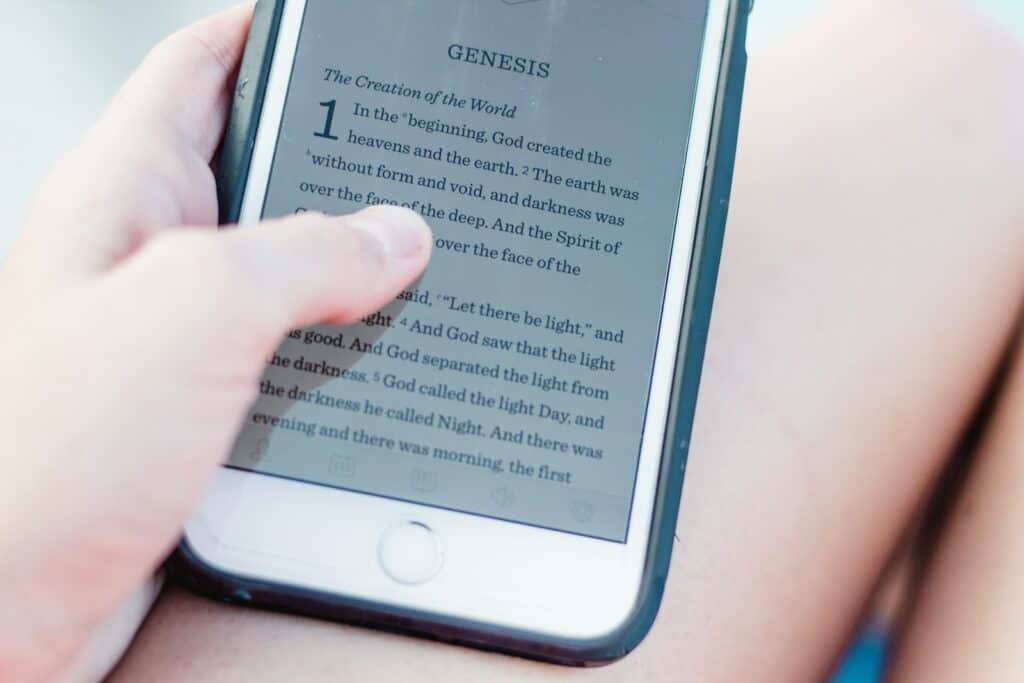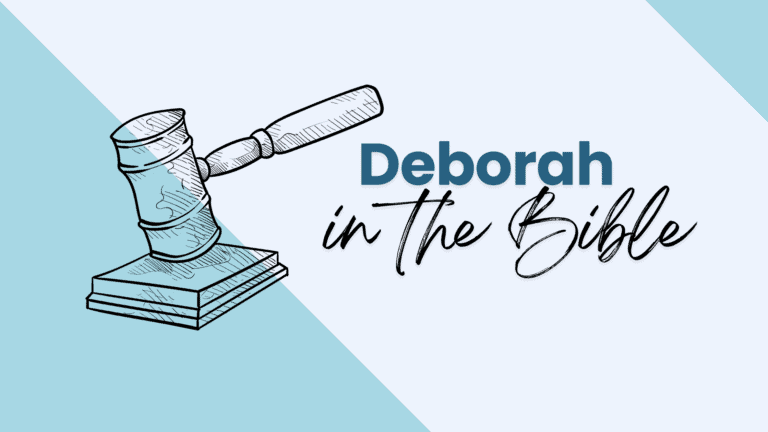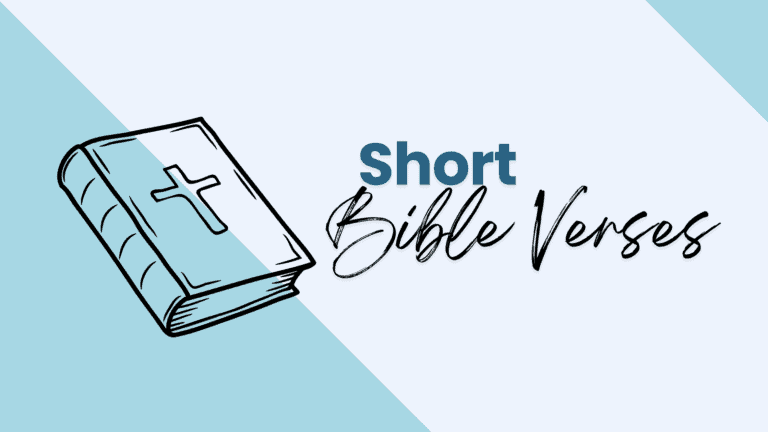A Beginner’s Guide On How To Study The Bible

Last Updated on April 19, 2023 by Avi Steen
Are you looking for a guide on how to study the Bible? If so, you’ve come to the right place! Studying the Bible is an incredibly rewarding experience that can help deepen your faith with Jesus and give you a better understanding of God’s word.
In this blog post, we’ll explore some tips and tricks on effectively studying the Bible as a beginner. We’ll discuss different methods of reading, interpreting, and applying scripture in your personal study and life.
Whether you’re just starting out or have been studying for years, this guide will provide valuable insight into getting the most out of your bible study time.
So let’s get started!

How Should a Beginner Read the Bible?
Before we begin, I should probably share how my Bible study efforts began because it wasn’t all tissues, tears, and revelation from the beginning.
It started with a simple Bible phone app, even though I owned a Bible that was gifted to me. I actually don’t remember opening the Bible given to me in college… like at all.
And yes, I grew up in the church, a Southern Baptist church (that was not in the South lol).
But, I was so far removed from the church, and my family did not live a righteous Bible-living way. So, my lifestyle was that of a sinner who didn’t know I needed saving.
So if I told younger me how to begin reading the Bible, I would tell her to just start.
Just open up the Bible inserted snuggly on the back of the pew, and just read.
- 3 Fascinating Leadership Lessons About Deborah in the Bible
- 7 Short Bible Verses for Quick Inspiration and Hope
- 5 Powerful Bible Verses About Healing That Will Bring Comfort
- Say a Prayer for Fertility in 5 Easy Steps
- 45 Creative Prayer Journal Ideas for Moms
Which Bible translation should I use?
Now translation, that’s an interesting question. I think the perfect Bible translation for a beginner is the English Standard Version(ESV) or the New Living Translation(NLT).
Both of these translations speak in plain English, unlike the more old language King James Version (KJV).
I will say that as I matured God’s word and my relationship with Him through the Holy Ghost, God’s word has become clearer. I refer to my KJV study bible daily for in-depth studying God’s word.

Choose a Bible Translation You Can Understand
So dive into a few bible translations as you begin and see which one you enjoy reading. Start with the new testament, but always refer back to the New KJV or KJV for clearer insight and better representation of the closest context to study God’s word.
7 Steps to Understanding the Bible as a Beginner
Being a new Christian can be an exciting but also intimidating journey, especially when it comes to reading the Bible. Many circumstances make it challenging to grasp what the Word of God is saying.
Perhaps it’s the use of outdated language or a topic that seems foreign to us in this world. But thankfully, with a bit of guidance, even a beginner can truly start to understand the depth of the Bible.
Here are seven simple steps to help you understand the Bible as a beginner.

1. Start Off with Prayer
Before you read the Bible, asking God for guidance is important because it’s His specific word to us. Prayer is the foundation of any relationship with God.
It’s a way to talk with Him, share your thoughts, and turn to Him for guidance. Before you start reading, take a moment to invite the Spirit of God into your heart and seek His help to understand the Word of God.
2. Use Commentary from Bible Scholars
One of the most helpful tools in understanding the Bible is to seek insight from Bible scholars. A good commentary can provide context, historical background, and a deeper understanding of the scriptures.
Several other bible commentaries also are available online, and they are usually tailored for specific books of the Bible.
A good commentary can guide you and give you fresh perspectives about passages that you might previously have found confusing.
My favorite online commentary is from Enduring Word, and you can check them out here.
3. Read a Particular Bible Passage Multiple Times
It takes time to understand the Bible well. You can’t read a passage once and expect to understand all of its meaning.
Instead, take time to read it multiple times slowly and meditate on it. To meditate on it means to think about it.
Consider the passage’s context, the meaning of the key words used, and the message it conveys.
Pay attention to what God might be speaking to you through the passage. One way to do this is by taking notes or journaling your insights and revelations as you read.

4. Read Various Bible Translations
Different Bible translations can provide different insights and make understanding the word of God easier. Each translation has a unique style and approach to phrasing that can help clarify the meaning of the passages you’re reading.
It’s good to compare a few verses from different versions as you read, especially if you have difficulty understanding a specific passage. Some of the popular translations for beginners include NIV (New International Version), ESV, and NLT, as we previously discussed.
5. Choose One Bible Study Method
There are various Bible study methods, such as bible verse mapping, word studies, and SOAP. These methods offer different ways to help you study and understand the Bible.
It’s important to choose a method that fits your learning style and helps you engage with scripture meaningfully.
It’s also good to choose a method that works with your schedule to ensure consistency in your bible studies. Consistency in reading the Bible daily is a common struggle for many Christians.
But once you’ve learned simple methods to keep you reading you can move to deeper studies like the inductive bible study method.

Simplest Bible Study Method to Start for Consistency
1. Pray before you begin. Ask God to help you understand your reading and give you wisdom.
2. Read the entire chapter or section before you start studying it in depth. This will give you a better understanding of the historical context.
3. Look up difficult words in a dictionary or commentary. Don’t just guess the original meaning of a word based on the context.
4. Make a list of questions about what you’ve read. These could be factual questions (e.g., Who was David’s father?), interpretive questions (e.g., What does this passage teach about God’s character?), or application questions (e.g., How can I apply this to my life?).
5. Find someone else to study the Bible with you. Having someone else to talk to about what you’re learning is always helpful.
6. Invest in a Study Bible
A study Bible is an excellent tool for beginners to understand the Bible better. It has footnotes, commentaries, cross-references, and study notes that explain the context and meaning of the passages.
This type of Bible will help you dive deeper into the word of God, and some may even include maps, charts, and other tools that are perfect for visual learners.
Here are a few Bible book recommendations available on Amazon:

7. Seek the Gift of the Holy Spirit
The Holy Spirit is a vital guide for believers in understanding the Bible, and inviting Him in the process is essential. Pray that God’s Spirit will give you the wisdom and insight to fully understand the Word of God.
The Holy Ghost also helps us apply the Scriptures to our lives, so we can live more closely to Christ.
Ask for His guidance, take time to listen, and learn to recognize the prompting of the Spirit go God as you study the Word of God.

Easy Bible Study Methods
Choosing a Bible App Plan
The YouVersion Bible Mobile App has thousands of plans available for any season of your life. You can choose the plan that suits you best, whether reading through the entire Bible in a year or simply meditating on one verse each day.
Download the YouVersion Bible to your phone
Journaling Your Bible Study
Keeping a journal while studying the Bible is an excellent way to document your growth, insights, and spiritual journey. Journaling allows you to record your thoughts and feelings about the passages you are reading and any questions or reflections that come up.
Looking back at my journals from when I started my journey, I can see so much growth. It’s inspiring and encourages me to continue this path with God.
Devoting Yourself to Memory Verses
Memorizing Bible verses is a great way to stay grounded in His Word. Pick out a few key verses from each chapter of the Bible and practice repeating them.
Consider using flashcards or a memorization app to help you remember the verses.
The SOAP Method
The SOAP method is great for getting the most out of your Bible study. The acronym stands for Scripture, Observation, Application, and Prayer.
This method encourages you to read a passage of scripture, observe any themes or messages it contains, think about how it applies to your life today, and then pray about what you read.

Simple Tips for a New Follower of Jesus Christ
Join a Bible Study Group in your Church or Community
One of the easiest ways to start studying the Bible is by joining a Bible study group in your church or community. This can be a great way to meet other Christians who are also studying the Bible and learn from more experienced believers.
Bible study groups also offer a structured approach to studying the Bible, which can be helpful for people who are just starting out. If you are unsure where to find a Bible study group, ask your church leader or search online for Christian groups.

Use Free Online Bible Study Tools and Apps
In today’s digital age, studying the Bible online has become easier than ever. Many free online resources can help you take a deeper dive into the Bible, such as Bible study apps, websites, and podcasts.
Some popular Bible study apps include YouVersion, Blue Letter Bible, and Bible Gateway. These apps offer different features, such as daily Bible readings, commentaries, devotionals, and study guides.
Online Bible study tools can be a great option if you are struggling to find time to attend a physical Bible study group.

End your Bible Study Time with Prayer
Have you seen a theme in this blog post yet? Prayer is an essential part of any Christian’s relationship with God!
It is how we communicate with God and express our gratitude, fears, and concerns. As you study the Bible, you must end your study time with prayer.
This can be a great way to reflect on what you have learned and ask God for guidance in applying it to your life. Prayer can also help you build a deeper connection with God and grow in your faith.
We hope this beginner’s guide has given you some insight into starting your own study of scripture, no matter where you are on your spiritual path. Whether it be through joining a bible study group or utilizing online resources like apps and podcasts, there are many ways to grow in knowledge about the holy text.

Don’t forget that prayer should also always accompany your studies – as it is essential for deepening our connection with God. Please leave us a comment below about how God has changed your Bible time and! We’d love to hear your testimony!
Bible Study FAQ
How Do I Start Studying the Bible for Beginners?
Just start. Open the bible to the new testament and read about Jesus’ life. That’s the best place to grasp the meaning of God’s word as you study the Bible.
How Can I Study My Bible by Myself?
When you study the Bible by yourself, it can be a bit overwhelming, but as you read, write notes and jot down questions to ask in a group or Church leader later.
What Are the Steps in Studying the Bible?
Pray for understanding. Read a translation you can understand. Use an online Bible Dictionary to see what the words in the Bible mean. Take notes as you go. Review your notes and ponder what God is saying to you. Pray for further understanding and wisdom, then apply it to your life!
What Do You Need To Get Started Studying the Bible?
To study the Bible, all you need is a Bible! But it’s helpful to also have note cards or a journal, some pens of varying colors to highlight a bible passage that stands out and a quiet place to read.
How Should a Beginner Read the Bible?
Read one bible passage when you study the bible, like John 3:16, and go from there. Read all of the book of John, and don’t feel pressured to read the whole bible in one sitting. Reading the Bible takes time, and in-depth study will only improve your knowledge and prayer life.

Octavia Steen is an NBDA certified fertility doula, health coach, certified fitness nutrition specialist, aspiring missionary with the COGIC, and owner of Mother Mindset. She helps future and current mamas become more consistent in faith + fitness and grow closer to God so they can create a healthier lifestyle from the inside out!







This is an amazing article! Thorough, yet put forth in a very readable manner. Thank you. You should consider creating a pdf version with hyper links. God Bless, Joe